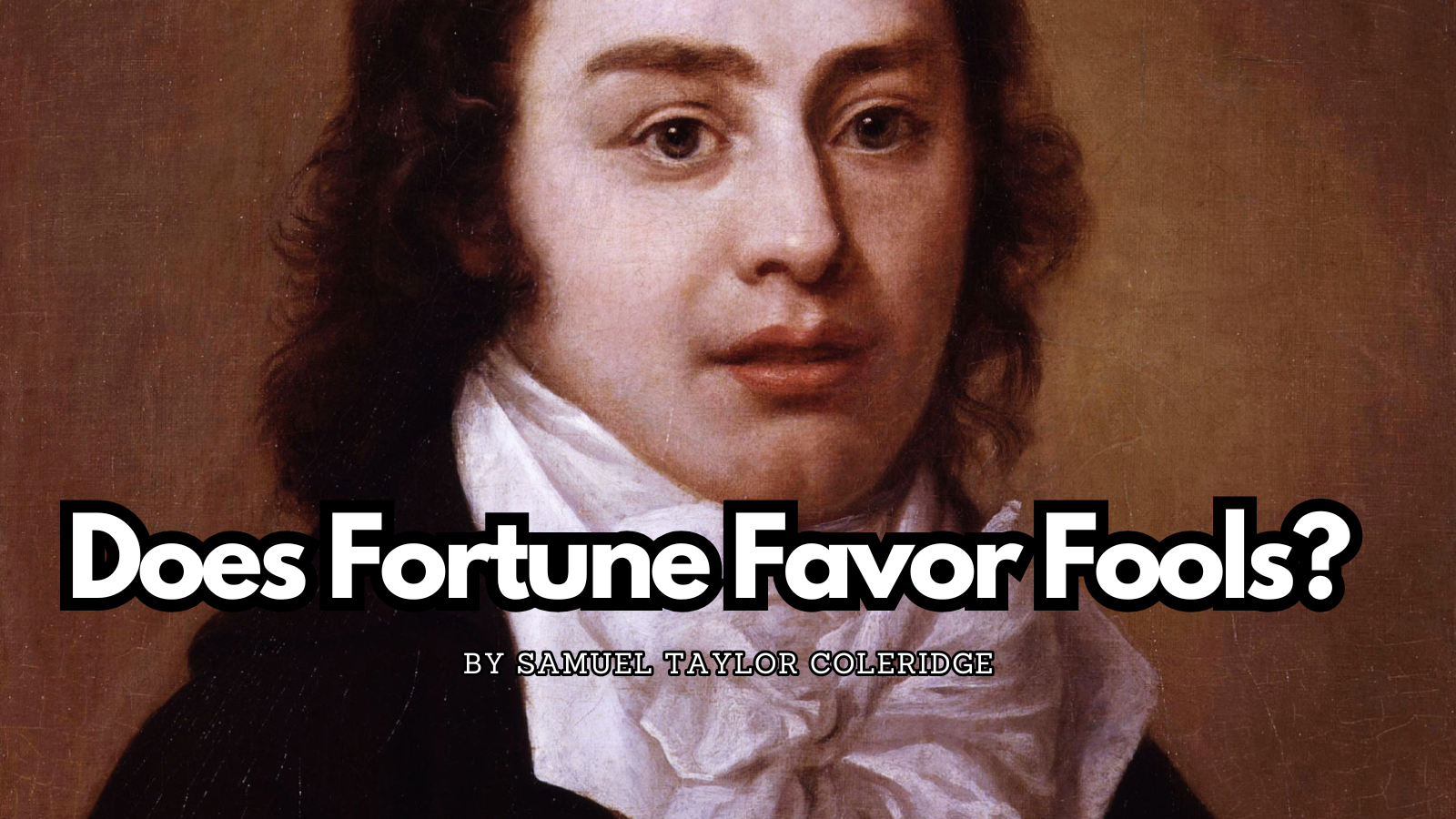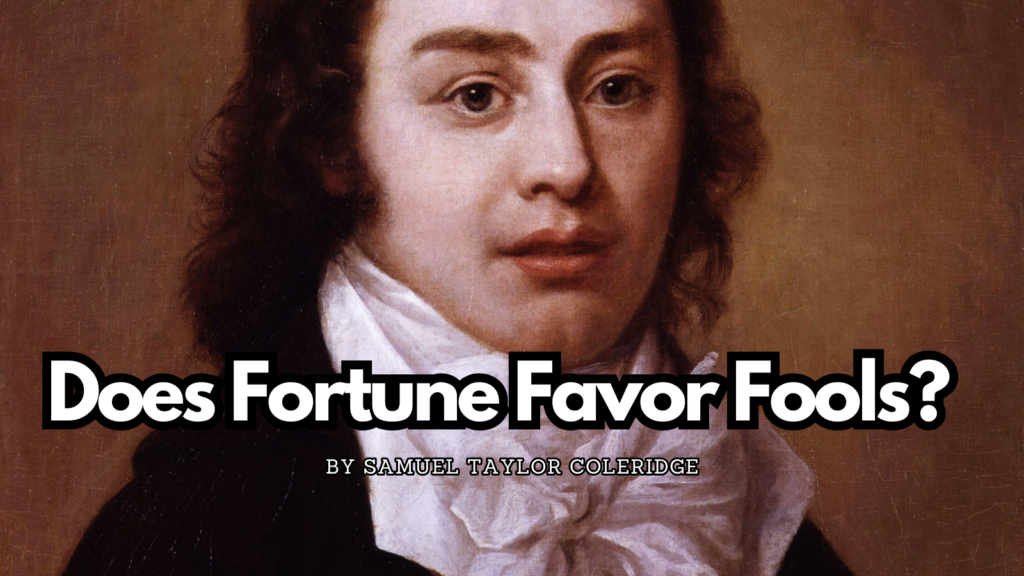Introduction: Does Fortune Favor Fools?
This article was updated April 4, 2025.
In an age where success is often attributed to skill and careful planning, there remains a curious saying that has persisted across centuries and cultures: “Fortune favors fools.” This paradoxical proverb, found in various forms throughout European languages, seems to challenge our fundamental understanding of merit and achievement. Why would luck—that most capricious of forces—bestow its blessings more readily upon the foolish than the wise?
In this thoughtful exploration, the renowned poet and philosopher Samuel Taylor Coleridge dissects this ancient adage with remarkable insight. Rather than dismissing the saying outright, Coleridge delves into its multiple interpretations, examining how our perceptions of luck, skill, and success intertwine in complex ways. Through careful reasoning and illustrative examples, he invites us to reconsider our understanding of fortune and its relationship to human capability.
As we navigate a world where viral success stories and overnight sensations seem to defy conventional wisdom about hard work and talent, Coleridge’s reflections remain surprisingly relevant. His analysis challenges us to look beyond simple explanations and consider the subtle interplay between chance, preparation, and our own biased observations of others’ achievements.
Join Coleridge as he unravels this linguistic puzzle and reveals the deeper truths that may lie behind one of history’s most enduring proverbs.
Does Fortune Favor Fools?
by Samuel Taylor Coleridge
“Does Fortune favor fools? Or how do you explain the origin of the proverb, which, differently worded, is to be found in all the languages of Europe?”
This proverb admits of various explanations, according to the moods of mind in which it is used. It may arise from pity, and the soothing persuasion that Providence is eminently watchful over the helpless, and extends an especial care to those who are not capable of caring for themselves. So used, it breathes the same feeling as “God tempers the wind to the shorn lamb”—or the more sportive adage, that “the fairies take care of children and tipsy folk.” The persuasion itself, in addition to the general religious feeling of mankind, and the scarcely less general love of the marvelous, may be accounted for from our tendency to exaggerate all effects that seem disproportionate to their visible cause, and all circumstances that are in any way strongly contrasted with our notions of the persons under them. Secondly, it arises from the safety and success which an ignorance of danger and difficulty sometimes actually assists in procuring; inasmuch as it precludes the despondence which might have kept the more foresighted from undertaking the enterprise, the depression which would retard its progress, and those overwhelming influences of terror in cases where the vivid perception of the danger constitutes the greater part of the danger itself. Thus men are said to have swooned and even died at the sight of a narrow bridge, over which they had ridden the night before in perfect safety, or at tracing the footmarks along the edge of a precipice which the darkness had concealed from them. A more obscure cause, yet not wholly to be omitted, is afforded by the undoubted fact that the exertion of the reasoning faculties tends to extinguish or bedim those mysterious instincts of skill, which, tho for the most part latent, we nevertheless possess in common with other animals.
Or the proverb may be used invidiously; and folly in the vocabulary of envy or baseness may signify courage and magnanimity. Hardihood and foolhardiness are indeed as different as green and yellow, yet will appear the same to the jaundiced eye. Courage multiplies the chances of success by sometimes making opportunities, and always availing itself of them: and in this sense Fortune may be said to favor fools by those who, however prudent in their own opinion, are deficient in valor and enterprise. Again, an eminently good and wise man, for whom the praises of the judicious have procured a high reputation even with the world at large, proposes to himself certain objects, and adapting the right means to the right end attains them; but his objects not being what the world calls Fortune, neither money nor artificial rank, his admitted inferiors in moral and intellectual worth, but more prosperous in their worldly concerns, are said to have been favored by Fortune and be slighted; altho the fools did the same in their line as the wise man in his; they adapted the appropriate means to the desired end, and so succeeded. In this sense the proverb is current by a misuse, or a catachresis at least of both the words, Fortune and Fools.
How seldom, friend, a good great man inherits
Honor or wealth with all his worth and pains!
It sounds like stories from the land of spirits,
If any man obtain that which he merits,
Or any merit that which he obtains.
REPLY
For shame! dear friend, renounce this canting strain!
What would’st thou have a good great man obtain?
Place? titles? salary? a gilded chain?
Or throne of corses which his sword hath slain?
Greatness and goodness are not means, but ends!
Hath he not always treasures, always friends,
The good great man? Three treasures, love, and light,
And calm thoughts regular as infants’ breath:
And three firm friends, more sure than day and night,
Himself, his Maker, and the angel Death?
But, lastly, there is, doubtless, a true meaning attached to Fortune, distinct both from prudence and from courage; and distinct too from that absence of depressing or bewildering passions, which (according to my favorite proverb, “extremes meet”) the fool not seldom obtains in as great perfection by his ignorance as the wise man by the highest energies of thought and self-discipline. Luck has a real existence in human affairs, from the infinite number of powers that are in action at the same time, and from the coexistence of things contingent and accidental (such as to us at least are accidental) with the regular appearances and general laws of nature. A familiar instance will make these words intelligible. The moon waxes and wanes according to a necessary law. The clouds likewise, and all the manifold appearances connected with them, are governed by certain laws no less than the phases of the moon. But the laws which determine the latter are known and calculable, while those of the former are hidden from us.
At all events, the number and variety of their effects baffle our powers of calculation; and that the sky is clear or obscured at any particular time, we speak of, in common language, as a matter of accident. Well! at the time of the full moon, but when the sky is completely covered with black clouds, I am walking on in the dark, aware of no particular danger; a sudden gust of wind rends the clouds for a moment, and the moon emerging discloses to me a chasm or precipice, to the very brink of which I had advanced my foot. This is what is meant by luck, and according to the more or less serious mood or habit of our mind, we exclaim, how lucky, or how providential! The copresence of numberless phenomena, which from the complexity or subtlety of their determining causes are called contingencies, and the coexistence of these with any regular or necessary phenomenon (as the clouds with the moon, for instance) occasion coincidences, which, when they are attended by any advantage or injury, and are at the same time incapable of being calculated or foreseen by human prudence, form good or ill luck. On a hot sunshiny afternoon came on a sudden storm and spoiled the farmer’s hay; and this is called ill luck. We will suppose the same event to take place when meteorology shall have been perfected into a science, provided with unerring instruments; but which the farmer had neglected to examine. This is no longer ill luck, but imprudence.
Now apply this to our proverb. Unforeseen coincidences may have greatly helped a man, yet if they have done for him only what possibly from his own abilities he might have effected for himself, his good luck will excite less attention and the instances be less remembered. That clever men should attain their objects seems natural, and we neglect the circumstances that perhaps produced that success of themselves without the intervention of skill or foresight; but we dwell on the fact and remember it, as something strange, when the same happens to a weak or ignorant man. So, too, tho the latter should fail in his undertakings from concurrences that might have happened to the wisest man, yet his failure being no more than might have been expected and accounted for from his folly, it lays no hold on our attention, but fleets away among the other undistinguished waves, in which the stream of ordinary life murmurs by us and is forgotten. Had it been as true as it was notoriously false, that those all-embracing discoveries, which have shed a dawn of science on the art of chemistry, and give no obscure promise of some one great constitutive law, in the light of which dwell dominion and the power of prophecy; if these discoveries, instead of having been, as they really were, preconcerted by meditation, and evolved out of his own intellect, had occurred by a set of lucky accidents to the illustrious father and founder of philosophic alchemy; if they presented themselves to Sir Humphry Davy exclusively in consequence of his luck in possessing a particular galvanic battery; if this battery, as far as Davy was concerned, had itself been an accident, and not (as in point of fact it was) desired and obtained by him for the purpose of insuring the testimony of experience to his principles, and in order to bind down material nature under the inquisition of reason, and forced from her as by torture, unequivocal answers to prepared and preconceived questions—yet still they would not have been talked of or described as instances of luck, but as the natural results of his admitted genius and known skill. But should an accident have disclosed similar discoveries to a mechanic at Birmingham or Sheffield, and if the man should grow rich in consequence, and partly by the envy of his neighbors, and partly with good reason, be considered by them as a man below par in the general powers of his understanding; then, “Oh what a lucky fellow! Well, Fortune does favor fools—that’s certain! It is always so!”—and forthwith the exclaimer relates half a dozen similar instances. Thus accumulating the one sort of facts and never collecting the other, we do, as poets in their diction and quacks of all denominations do in their reasoning, put a part for the whole, and at once soothe our envy and gratify our love of the marvelous, by the sweeping proverb, “Fortune favors fools.”
Why Writers Should Read This Essay
For writers at any stage of their career, Coleridge’s examination of “Fortune favors fools” offers invaluable insights that extend far beyond the proverb itself. First and foremost, this essay provides a masterclass in analytical thinking. Coleridge demonstrates how to approach a seemingly simple saying and unpack its various dimensions, revealing the complex human experiences and observations that have kept it alive through generations. This precise dissection of language and meaning is essential for writers who seek to craft work with genuine depth and nuance.
Moreover, Coleridge’s essay speaks directly to the writer’s experience in a publishing landscape often perceived as arbitrary and unpredictable. Many writers have witnessed seemingly average works achieve extraordinary success while brilliant manuscripts languish unnoticed. Rather than surrendering to cynicism or attributing success merely to good fortune, Coleridge offers a more sophisticated framework for understanding the interplay between merit, circumstance, and perception.
The essay also showcases Coleridge’s remarkable prose style—fluid yet precise, intellectual yet accessible. His ability to balance philosophical inquiry with concrete examples and graceful turns of phrase provides a stylistic model worthy of study. Note how he transitions seamlessly between abstract concepts and relatable illustrations, maintaining clarity while exploring complex ideas.
Perhaps most importantly, Coleridge’s reflections on fortune and foolishness contain essential wisdom about the creative life itself. Writers regularly face rejection, unexpected success, and the myriad uncertainties of a creative career. Understanding how to navigate these unpredictable elements—distinguishing between what we can control and what we cannot—is fundamental to maintaining both productivity and sanity in the writing life.
In an era of algorithms, viral content, and seemingly overnight literary sensations, Coleridge’s centuries-old wisdom provides a thoughtful counterbalance to both naive optimism and bitter resignation. It reminds us that the relationship between merit and success has always been complex, and that this complexity deserves our careful consideration rather than dismissive platitudes.
Analysis of “Does Fortune Favor Fools?” by Samuel Taylor Coleridge
Rhetorical Structure and Argumentative Approach
Coleridge’s essay on the proverb “Fortune favors fools” exemplifies his characteristic approach to philosophical inquiry—methodical, nuanced, and resistant to reductive conclusions. Rather than simply affirming or rejecting the proverb, Coleridge explores multiple interpretations, recognizing that a saying this enduring likely contains layers of truth worth examining.
The essay begins with a question—”Does Fortune favor fools? Or how do you explain the origin of the proverb?”—establishing an exploratory rather than declarative tone. This rhetorical strategy invites readers to join him in contemplation rather than positioning himself as an authority delivering a verdict. Throughout the piece, Coleridge employs a balanced analytical approach, considering various perspectives before offering his own synthesis.
His argument progresses through several potential explanations, each building in complexity and insight:
- First, he considers benevolent interpretations: that Providence extends special care to the vulnerable, comparable to other folk sayings like “God tempers the wind to the shorn lamb.”
- Next, he examines practical advantages of foolishness: how ignorance of danger can sometimes prevent the paralyzing fear that might hinder action.
- He then addresses invidious uses of the proverb: how envy or baseness might relabel courage as foolishness, or misapply the concept of “fortune” to worldly success rather than moral achievement.
- Finally, he arrives at what he considers the “true meaning”—the genuine role of unpredictable coincidences in human affairs.
This progressive structure reveals Coleridge’s commitment to intellectual thoroughness and fair consideration of multiple viewpoints before reaching conclusions.
Philosophical Depth and Conceptual Distinctions
Coleridge’s analysis demonstrates his exceptional ability to make precise conceptual distinctions. Throughout the essay, he carefully differentiates between related concepts that might be carelessly conflated:
- He distinguishes between “courage” and “foolhardiness,” noting they are “as different as green and yellow, yet will appear the same to the jaundiced eye.”
- He separates “luck” from both “prudence” and “courage,” carving out a distinct conceptual space for genuine contingency.
- He differentiates between events that are truly unpredictable versus those that are merely unpredicted due to human limitations.
These nuanced distinctions allow him to isolate the specific phenomenon he wishes to examine: true luck as “the copresence of numberless phenomena” that create coincidences “incapable of being calculated or foreseen by human prudence.”
The philosophical sophistication of Coleridge’s analysis becomes particularly evident when he engages with the relationship between determinism and contingency. He acknowledges that natural laws govern both predictable phenomena (like lunar phases) and seemingly random ones (like cloud formations), but argues that the complexity and multitude of causal factors in the latter create genuine unpredictability from the human perspective. This allows him to reconcile a natural order with the lived experience of chance.
Psychological Insight and Cognitive Bias
Perhaps most remarkably for a text written in the early 19th century, Coleridge’s essay identifies what modern psychologists would call cognitive biases in our perception and interpretation of luck. He observes:
- Confirmation bias: “accumulating the one sort of facts and never collecting the other”
- Attribution bias: “That clever men should attain their objects seems natural… but we dwell on the fact and remember it, as something strange, when the same happens to a weak or ignorant man.”
- Narrative fallacy: “we put a part for the whole” when forming sweeping conclusions from limited observations
These observations anticipate by nearly two centuries the systematic study of cognitive biases in behavioral psychology. Coleridge recognizes how our selective attention and memory create distorted narratives about luck and success, reinforcing proverbs like “Fortune favors fools” despite contradictory evidence.
Literary Technique and Illustrative Examples
Coleridge employs several powerful examples to illuminate his argument, notably:
- The moonlight revealing a precipice: This central metaphor brilliantly illustrates the concept of luck as the meaningful coincidence of independent causal chains (the moon’s phases, the cloud patterns, and the walker’s path).
- The farmer’s hay ruined by an unexpected storm: Here Coleridge contrasts genuine bad luck with mere imprudence, anticipating how scientific advancement might transform one into the other.
- Sir Humphry Davy’s chemical discoveries: By contrasting the actual methodical process of scientific discovery with a hypothetical accidental one, Coleridge demonstrates how social perception of similar outcomes differs based on our preconceptions about the individuals involved.
These examples showcase Coleridge’s ability to concretize abstract philosophical concepts, making them accessible while sacrificing none of their complexity.
Cultural and Historical Context
While maintaining philosophical rigor, Coleridge’s essay also reflects the intellectual currents of his era. His discussion of scientific advancement (particularly chemistry) demonstrates engagement with the rapid scientific progress of the early 19th century. His reference to “philosophic alchemy” and Sir Humphry Davy’s experiments with galvanic batteries places the essay firmly in the context of the scientific revolution transforming European thought.
Similarly, the poetic exchange about the “good great man” who inherits neither “Honor or wealth” reflects Romantic period concerns with authentic virtue versus social recognition—themes that appear throughout Coleridge’s work and that of his contemporaries.
Relevance to Contemporary Discourse
Despite being written approximately two centuries ago, Coleridge’s analysis remains remarkably relevant to modern discussions about success, luck, and merit. In an era of viral sensations, overnight millionaires, and heated debates about meritocracy, his recognition of the complex interplay between skill, circumstance, and perception offers a more nuanced framework than either “success is purely meritocratic” or “success is purely random.”
His analysis of how we selectively notice, remember, and explain outcomes based on our preexisting beliefs about individuals anticipates contemporary discussions about privilege, bias, and the attribution of success. By acknowledging both genuine contingency and our psychological tendency to misinterpret its role, Coleridge provides insights that remain valuable for understanding modern debates about fortune and achievement.
Conclusion
Coleridge’s exploration of “Does Fortune favor fools?” exemplifies philosophical prose at its finest—methodical yet engaging, intellectually rigorous yet accessible through concrete examples. The essay demonstrates not only his remarkable analytical abilities but also his psychological insight and literary skill. By approaching a seemingly simple proverb with such depth and nuance, Coleridge transforms a folk saying into an opportunity for profound reflection on luck, perception, and human psychology. Two centuries later, his analysis continues to offer valuable insights into how we understand, misunderstand, and explain the distribution of fortune in human affairs.
About the Author
Samuel Taylor Coleridge (1772-1834) was one of the foremost figures of the British Romantic movement, renowned as a poet, philosopher, literary critic, and theological thinker. Born in Devonshire, England, as the youngest of ten children, Coleridge displayed remarkable intellectual gifts from an early age. After his father’s death, he was sent to Christ’s Hospital school in London, where he formed a lifelong friendship with fellow Romantic poet Charles Lamb.
Coleridge’s poetic legacy includes such masterpieces as “The Rime of the Ancient Mariner,” “Kubla Khan,” and “Christabel”—works characterized by their supernatural elements, vivid imagery, and philosophical depth. Together with William Wordsworth, he published “Lyrical Ballads” in 1798, a collection often considered the founding document of English Romantic poetry.
Beyond his poetic achievements, Coleridge was a formidable intellectual whose interests encompassed philosophy, theology, politics, and science. His lectures on Shakespeare revolutionized literary criticism, while his philosophical works, including “Biographia Literaria,” helped introduce German Idealist philosophy to English readers. Throughout his life, Coleridge struggled with opium addiction, initially prescribed for medical conditions, which complicated his personal and professional life.
Despite periods of creative difficulty and personal hardship, Coleridge’s contributions to literature, criticism, and philosophical thought remain profound. His penetrating intellect, as demonstrated in essays like “Does Fortune Favor Fools?”, exemplifies his ability to examine everyday sayings and common beliefs with uncommon depth and insight, revealing the complex psychological and philosophical dimensions underlying human experience.
Further Reading
For readers intrigued by Coleridge’s exploration of luck, fortune, and human perception in “Does Fortune Favor Fools?”, the following works offer valuable extensions and complementary perspectives:
More by Samuel Taylor Coleridge
- Biographia Literaria (1817) – Coleridge’s major work of literary criticism and autobiography provides deeper insight into his philosophical approach and intellectual development. Chapters 13 and 14, with their exploration of imagination and fancy, reveal the theoretical underpinnings of his analytical method.
- The Friend (1809-1810, revised 1818) – This collection of essays showcases Coleridge’s political and moral philosophy, with numerous explorations of how language and common sayings shape our understanding of complex concepts.
- Aids to Reflection (1825) – For those interested in how Coleridge’s analytical approach intersects with his spiritual thought, this work demonstrates his application of careful reasoning to matters of faith and morality.
Contemporary Works on Luck, Success, and Cognitive Bias
- Fooled by Randomness by Nassim Nicholas Taleb – This modern examination of luck, randomness, and our misperception of causality offers striking parallels to Coleridge’s insights, updated with contemporary examples from finance and daily life.
- Thinking, Fast and Slow by Daniel Kahneman – Kahneman’s exploration of cognitive biases and heuristics provides scientific validation for many of the psychological patterns Coleridge identified intuitively in his essay.
- Success and Luck: Good Fortune and the Myth of Meritocracy by Robert H. Frank – This economic examination of how random factors influence achievement offers a data-driven perspective on the questions Coleridge addressed philosophically.
On Coleridge’s Life and Thought
- Coleridge: Early Visions and Coleridge: Darker Reflections by Richard Holmes – This acclaimed two-volume biography provides rich context for understanding how Coleridge’s personal struggles and intellectual journey shaped his analytical perspective.
- The Rime of the Ancient Mariner and Other Poems – For readers primarily familiar with Coleridge’s prose, his poetic works offer a complementary window into his preoccupation with fate, consequence, and the supernatural elements that influence human affairs.
- Coleridge and the Psychology of Romanticism by David Vallins – This scholarly work explores Coleridge’s pioneering insights into human psychology, many of which anticipate modern psychological theories.
Primary Sources from Coleridge’s Era
- An Enquiry Concerning Human Understanding by David Hume – Hume’s influential work on causation and probability formed part of the philosophical background against which Coleridge developed his own ideas about chance and necessity.
- Sir Humphry Davy’s Collected Works – The scientific discoveries Coleridge references in his essay can be explored through the writings of his friend and contemporary, illuminating the scientific revolution that influenced Coleridge’s thinking about natural laws and contingency.
- 100 Screenwriting Ideas to Get You Writing - January 20, 2026
- 100 Winter Storm Writing Prompts - January 17, 2026
- 100 Haunted House Story Starters: Craft Your Scariest Tale Yet - January 10, 2026





